Meet the intrepid people who have traded traditional living spaces for life on w
An associate editor of a magazine, a couple of teachers, a shipwright, and a motorsport journalist have one thing in common—they all live on boats


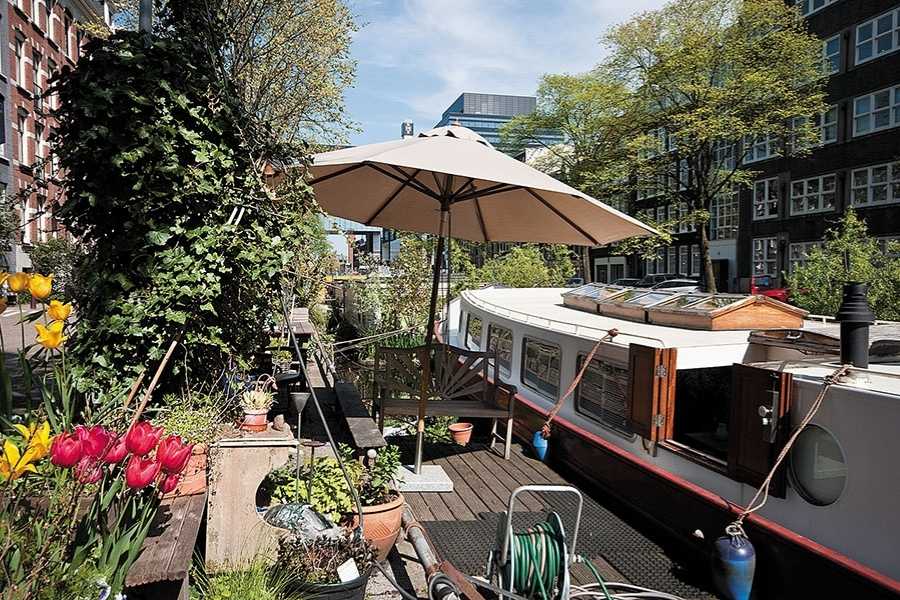 Image: Joost Naber
Image: Joost Naber
In 2009, Sarah Henshaw, disenchanted with her job as an entertainment journalist in London, decided to change tracks and open a bookstore. She realised that if the bookstore was on a boat, she could trade a hefty rent for a comparatively nominal annual mooring fee. Within a month of first having the idea, she became the proud owner of a 57-foot narrowboat that she named Joseph. In June 2009, after onboard amenities like the kitchenette, shower, and toilet had been replaced with bookshelves, The Book Barge opened to the public.
“The idea was never to live on the boat or to travel with it,” says Henshaw, now 37. “The idea was just to have a bookshop.” But gradually it became apparent that a small indie bookshop was no match for online booksellers or ebooks. Despite business being quite brisk initially, and The Book Barge hosting many literary events, the sound of footsteps clattering down the gangplank became less frequent each day. By 2011, the business was in trouble. This, coupled with upheavals in Henshaw’s personal life, made her feel a bit at sea. “The business was failing, and I felt like I was failing as a person,” she recalls. “The desire to run away was part of why I moved onto the boat.”
One day in May 2011, Henshaw set off from Staffordshire in the Midlands, in Joseph, ostensibly to run away, but to also drum up business. The Book Barge had acquired a loyal following around the country, and Henshaw posted her location on social media as she cruised along. Wherever she docked, a stream of customers waited to come aboard and shop. They sometimes even bartered goods or services (groceries, home-cooked meals, haircuts, a couch for the night, or the use of a shower) in exchange for books. In some ways it was a hard life, although not without benefits.
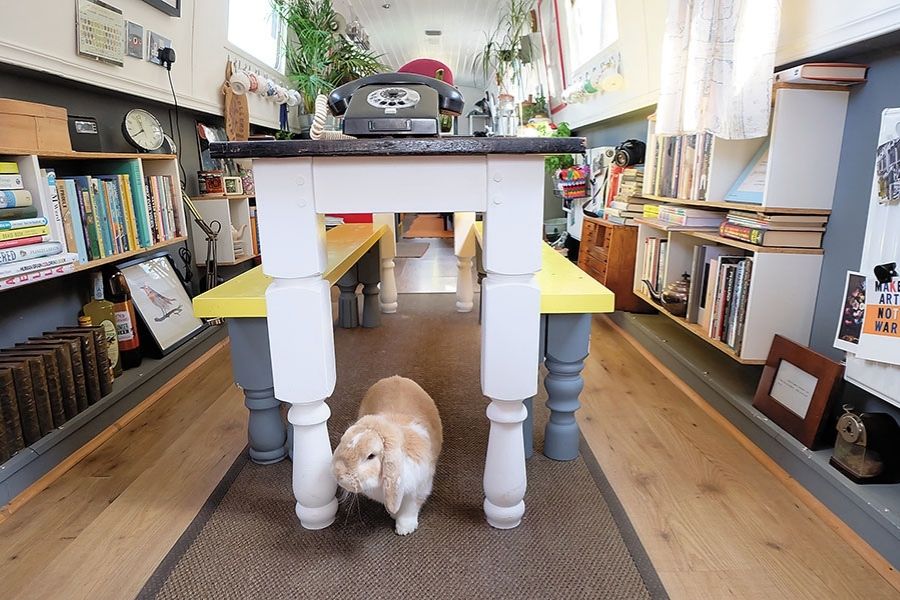
Living on a boat is a way of life that is simply addictive, says Sarah Henshaw, the owner of a 57-foot narrowboat called Joseph. She ran a bookshop—The Book Barge—on it after replacing amenities like the kitchenette, shower and toilet with bookshelves. Image: Sarah Henshaw/The Book Barge[br]
“Having so much going on really focussed me. Because I had to think of really basic things like ‘Oh, where’s the next pub so I can use the bathroom. And where can I moor up for the night, also near a pub, so I can clean my teeth’, because I didn’t have a sink or anything.” Henshaw spent six months traversing the British canal system, covering 1,736 km, crossing through 700 locks, with only Joseph who by then she believed, had developed a personality of his own. Now, looking back, she laughs, “I felt really lonely and isolated at the time. Stories, and the boat, became a thing of comfort for me.”
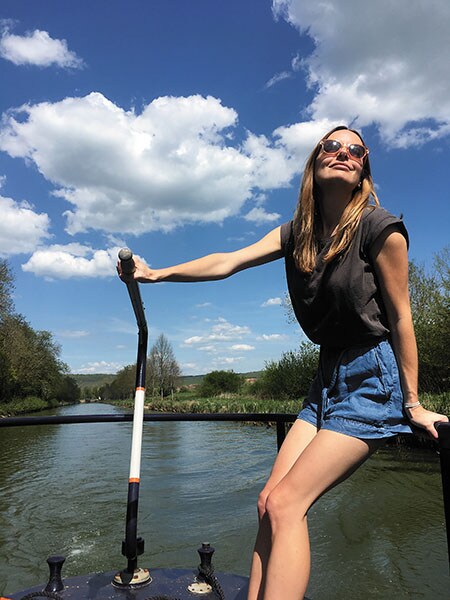
Sarah Henshaw/The Book Barge
The journey had a transformative effect on Henshaw. “I’ve never had much confidence, but I became quietly confident that I could survive and be happy all by myself, which was a nice thing.” She also learnt to accept help from others. “I realised that even if you’re a mess, there are other people who will support you and you’ll be alright.” But the most profound lesson was, “To expect the best in people. If you meet strangers with suspicion or reservations, they will react accordingly. That’s certainly been my experience.” The other highlight of Henshaw’s adventure was that her blog caught the attention of a publisher, and she landed a book deal: The Bookshop That Floated Away was published by Constable in 2014.
Henshaw, now the associate editor of a magazine called Waterways World, lives in the south of France, having crossed the English Channel aboard Joseph (now restored to accommodate a living space as well). The 2,000-km journey took her and husband Stuart (with their pet rabbit Napoleon Bunnyparte) from Staffordshire to Belgium, and into France over six months. Joseph is now mostly moored just around the corner from Henshaw’s house, but is being readied for thereopening of The Book Barge in its new avatar: As a bed and breakfast-cum-floating bookstore. It’s Henshaw’s attempt to give people a taste of the life she’s lived. “Our generation won’t settle for having one job at a company and retiring from there. They are hungry for new experiences, and boating is a brilliant way to feed that,” she says.
Perfectly illustrating this sentiment are Samantha Baiden-Reid, 34, and Tim Biglowe, 29, who decided, mid-pandemic, to acquire and move onto a narrowboat. The couple spent the last five years moving to a new city or country every year, throwing themselves into a fresh adventure each time. Both were teaching English in China until February 2020, when the pandemic resulted in them moving back to the UK. “We were saving to buy a house, but our time there was cut short. So we came back with less money than expected,” Biglowe says.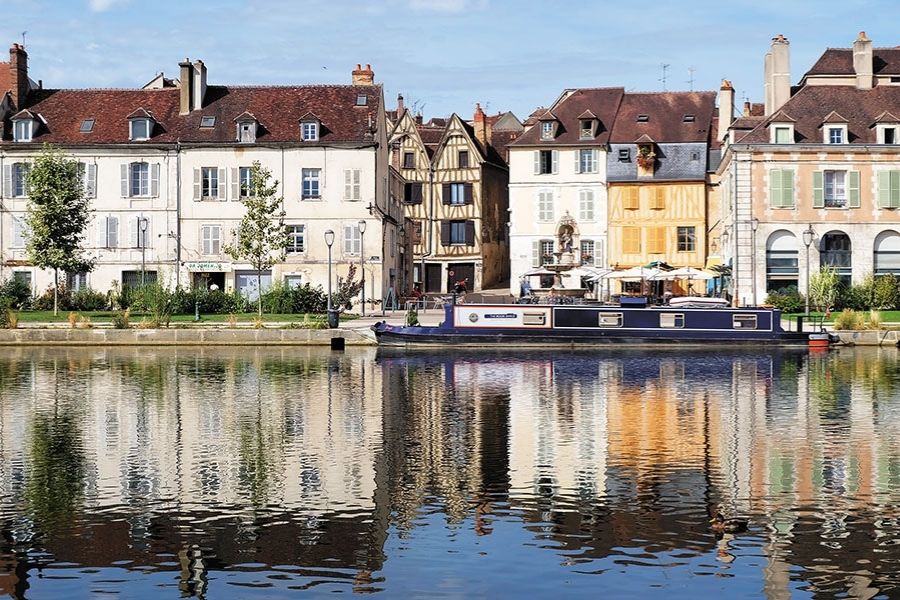
One day, whilst on the train back from looking at properties that didn’t suit them or their budget, they went past a canal. “Maybe we should live on a boat like Rosie and Jim,” Baiden-Reid quipped, referencing the characters from a British children’s television show. What started out as a joke turned into reality. “I started researching, and there’s quite a close community of people who live on boats. And it seemed interesting to be part of that unique club of people,” Biglowe says. For Baiden-Reid, there was more to it. “We wanted to keep the adventure going,” she says, unwilling to give up on new experiences and exploits. In June, they found a 53-foot narrowboat named Mary L, and after spending a month doing it up, they moved on board.
In the first two weeks aboard, Biglowe and Baiden-Reid were on holiday, motoring along to get as far away from the marina where Mary L had been docked. With no boating experience, learning to manoeuvre the narrow canals took a little while, as did learning the mechanisms of the tricky canal locks. But eventually they eased into their new life. After two weeks, both returned to work, teaching English online during the first half of the day and often setting off for a new destination after that. “In the summer, when it was quite light out, we’d get to a place, moor up in the evening, and maybe go into the town and get dinner at the pub, which was quite nice,” Biglowe says.
Baiden-Reid and Biglowe have opted to “continuously cruise”, a term for motoring along the canals and docking at each mooring only for as long as it is free (between 24 hours and two weeks), and not paying for a permanent mooring spot. It comes with the opportunity to see the country on their own terms. And what of the fact that they’ve chosen this itinerant life amidst the pandemic? “Well, it seems quite a sensible place to be in,” Baiden-Reid says. “We’re often out in the countryside, so we can go on walks and bike rides.” But Biglowe adds, “I’ve had moments when I’ve realised that this is not something I want to do forever this is something I want to enjoy for the next few years.”
But for 53-year-old Joost Naber, living on the water has been a way of life for over 30 years. It began in 1985, when his brother and he had trouble finding an apartment in Amsterdam. Their father helped them out, initially considering buying property in the city, and ultimately settling on a houseboat. “It was a concrete houseboat, which was more like an apartment than a ship, and had a living space of 80 sq mt,” Naber recalls.
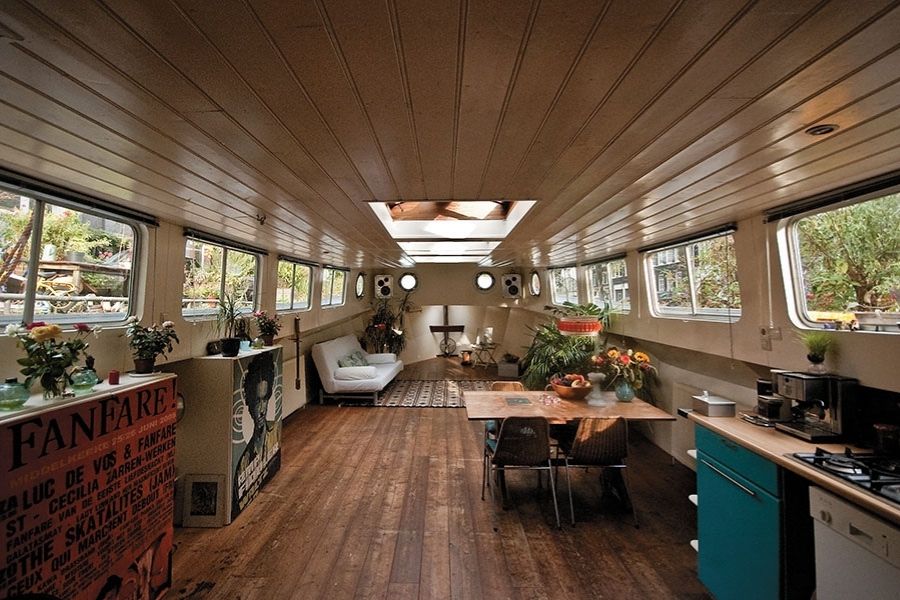
Living on the water has been a way of life for over 30 years for Joost Naber. On Sundays, he organises concerts at the front of the boat for family and friends. Image: Joost Naber
After eight years, Naber moved out, living in Amsterdam, travelling through Asia and living in India. It was serendipity that when he moved back to Amsterdam and began looking for a place to live, he found the boat docked next to his brother’s for sale.
Naber lived on that 35 sq mt boat for the next four years, and in 2000 found a larger one in the north of Holland, and had it towed to Amsterdam. “I took the engine out because that takes a lot of space, and rebuilt the inside. When I got it, it was just the hull with no building on top.” It took him and his father a whole year to rebuild the boat, with some advice from an experienced boat builder, and help from family and friends. “So for 20 years I’ve been living on the boat—Nashatram—that I’ve built with my father,” he says. The building process helped Naber pick up a trade, and he now maintains and restores boats, as well as rents out a holiday houseboat in Amsterdam.
Today, Naber’s family includes his wife Kiek Bosch, 49, and nine-year-old daughter Nika. Bosch, who moved in around 10 years ago, says the idea of living on a boat didn’t phase her one bit, but she did have to allay the fears of her friends and family that the boat would be too cold. “It’s quite luxurious and very warm with the central heating,” she laughs. The fact that she’s a saxophone player means that a life on the water suits her. “In an apartment, you might disturb the neighbours while playing, but out here on the water I feel more comfortable that not everyone can hear me.”
Naber, who regularly organises concerts in the city, adds, “When we get bands from other parts of the world, they usually play a concert at the venue on a Saturday, and on Sunday we organise a small concert at the front of the boat for 20 to 25 friends. People love it—this sense of community,” he says. But for him the overwhelming advantage of living on a boat is its unparalleled freedom. “When you live on a 50 sq mt boat, it feels like it’s 150 sq mt because of the space around you: The canal, the water, the street side, and the deck terrace. It’s so different from feeling boxed into an apartment,” he says. As for young Nika? She nonchalantly says, “For me it’s normal, because I was born here. But when some people from my class come for sleepovers, they think, ‘Wow! What’s happening, is it going to move?’ For them it’s kind of scary.”
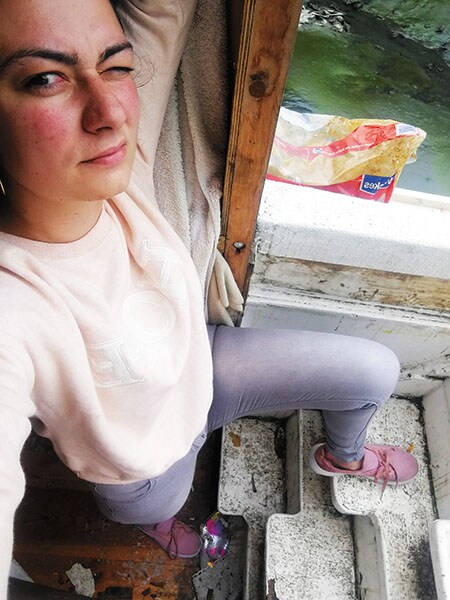
Hazel Southwell has much advice to share about the boat life, which she picked up whilst living aboard the fibreglass Loch Ayim that was permanently docked at Deptford Creek. Image: Hazel Southwell
Hazel Southwell, 33, a motorsport journalist from the UK, lived on a fibreglass boat named Loch Ayim, which was permanently docked at Deptford Creek between 2014 and 2016. “Whenever someone says they want to live on a boat, I’m usually the first person to say, ‘Absolutely do not do it’,” she laughs. This is because her boat “lacked some crucial amenities, amongst them a door, any power, water, and being sealed from the elements”, she says. “There’s also lots of stuff you have to do by yourself, and the ability to put tasks off for a later date vanishes entirely,” she adds.
In fact Southwell has many caveats about the boating life, including, “There’s no point living on a boat unless you have enough sealant,” and, “You’re always going to need some tarpaulin,” and, “If your boat develops a leak, a quick way to fix it is to take a two-pound coin, place it over the hole, and seal it in place with marine epoxy!” But even the fact that she lived on a somewhat leaky boat, and was cold a lot of the time, hasn’t entirely put her off the idea. “I sometimes find myself thinking, ‘Wouldn’t it be nice to be on the deck enjoying a cup of coffee?’” she says. “I think I’d do it again, but in a warmer country!”
This desire to return to boats is common to many people who’ve had a taste of that life. Naber says, “When I lived with my brother for eight years and I moved out, I really missed it. Later, when I was looking to buy an apartment, and my brother called to tell me that there was a boat for sale, it immediately got my heart pounding. It was this feeling of ‘This is what I want!’” he says. It’s something Henshaw seems to agree with, saying that every day as she goes past Joseph on her morning run, she has this desire to simply go on board and set off once again. It’s a way of life that she says is, “Simply addictive. You just fall in love with it.”
First Published: Apr 16, 2021, 13:22
Subscribe Now